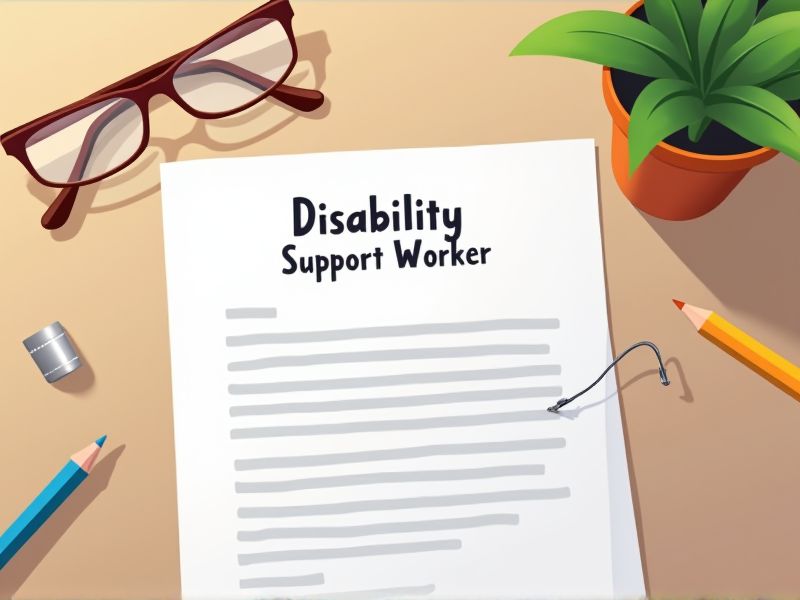
Hiring qualified Disability Support Workers ensures quality care and safety for individuals with disabilities. Certification verifies a worker's skills and knowledge, leading to better service provision. Employers and clients gain confidence in certified workers, reducing risks and liabilities. Here are some important certifications you may need as a Disability Support Worker.
Certificate III in Individual Support (Disability)
A Certificate III in Individual Support (Disability) equips individuals with specialized knowledge and skills required for effective assistance in diverse care environments. It ensures that support workers understand the complexities of various disabilities and the appropriate methods to enhance quality of life. Accreditation validates proficiency in not only fundamental care practices but also in adhering to regulatory and safety standards critical to disability support. The certificate fosters confidence in employers and clients, ensuring that care providers are equipped to handle sensitive and potentially challenging situations professionally.
Certificate IV in Disability
The Certificate IV in Disability equips Disability Support Workers with essential skills and knowledge necessary for providing quality care to individuals with disabilities. This qualification ensures workers understand diverse needs, facilitating personalized support plans that meet specific client requirements. It addresses essential legal and ethical considerations, reducing risks and promoting compliance within professional practice. By enhancing communication skills and practical experience, the certificate boosts worker confidence and improves client interactions and outcomes.
Basic First Aid and CPR Certification
Disability support workers often encounter health emergencies where basic first aid and CPR skills can save lives. Proper certification ensures they can respond promptly and effectively to accidents or medical crises. This capability not only enhances the safety and well-being of individuals under their care but also increases trust from families and employers. Regulatory bodies may require such certification to ensure compliance with health and safety standards.
Manual Handling and Safe Moving Certification
Manual Handling and Safe Moving Certification is crucial for disability support workers to prevent workplace injuries by ensuring proper techniques when assisting clients. A solid understanding of safe moving practices reduces the risk of harm to both the worker and the individual they support. Certification ensures compliance with legal safety regulations and workplace health standards. Effective training increases the worker's confidence in handling clients, leading to improved care and safety outcomes.
Medication Administration Certification
Medication Administration Certification is crucial for a Disability Support Worker as it ensures proper and safe handling of medications, reducing the risk of errors that could harm clients. Certified workers demonstrate competence in following legal and medical guidelines, which is essential for maintaining the trust and safety of clients under their care. By having this certification, support workers can contribute to a higher standard of healthcare service, improving overall client outcomes. Furthermore, the certification enhances the professional credibility of the workers, increasing employment opportunities within the healthcare industry.
Mental Health First Aid Certification
Mental Health First Aid Certification equips disability support workers with essential skills to recognize early signs of mental health issues, fostering timely intervention. With this training, workers can effectively manage crisis situations, enhancing the safety and well-being of their clients. Understanding mental health factors allows for more empathetic and informed support, improving communication and care strategies. This certification increases confidence among workers, reducing stress and burnout, thereby contributing to a stable work environment.
Positive Behaviour Support Certification
Positive Behaviour Support (PBS) Certification provides Disability Support Workers with essential skills to identify and address challenging behaviors effectively. Without this certification, support workers may inadvertently use outdated or ineffective techniques, leading to suboptimal outcomes for individuals with disabilities. Certification ensures that workers are well-versed in personalized strategies, fostering environments where individuals can thrive. As evidence-based practices form the core of PBS, the certification process equips workers with tools to enhance the quality of care, promoting dignity and independence for those they support.
Infection Prevention and Control Certification
Acquiring Infection Prevention and Control Certification equips disability support workers with critical knowledge, reducing infection risks among vulnerable populations. Certified workers can implement effective hygiene practices, directly decreasing the potential spread of contagious diseases. This certification enhances workers' credentials, aligning them with health industry standards and increasing their employability. It fosters a safer environment for both workers and clients, leading to improved health outcomes and trust in care services.
Communication and Interpersonal Skills Certification
Effective communication and interpersonal skills are essential for disability support workers as they enhance the ability to understand and meet the needs of clients. Proficiency in these areas leads to better collaboration with healthcare professionals and family members, which ensures comprehensive care. Certification in these skills often indicates a worker's commitment to quality service, increasing the trust of clients and employers. Such credentials also typically equip workers to handle diverse situations with empathy and cultural sensitivity.
Cultural Awareness and Sensitivity Certification
A Cultural Awareness and Sensitivity Certification equips disability support workers to effectively engage with clients from diverse backgrounds, improving communication and service delivery. Understanding cultural nuances enables workers to respect and accommodate individual preferences, enhancing client satisfaction. The certification also addresses potential biases, reducing the risk of misunderstandings or conflicts. In recognizing cultural influences on disability perceptions, support workers can tailor their approaches, promoting more inclusive and effective care.
Summary
As a reader gaining certifications in disability support, you can expect enhanced competency in providing specialized care. This increased knowledge often leads to improved client outcomes and satisfaction. With certifications, you may also see greater employment opportunities and career advancement prospects. Certification often results in higher earning potential within the field.
